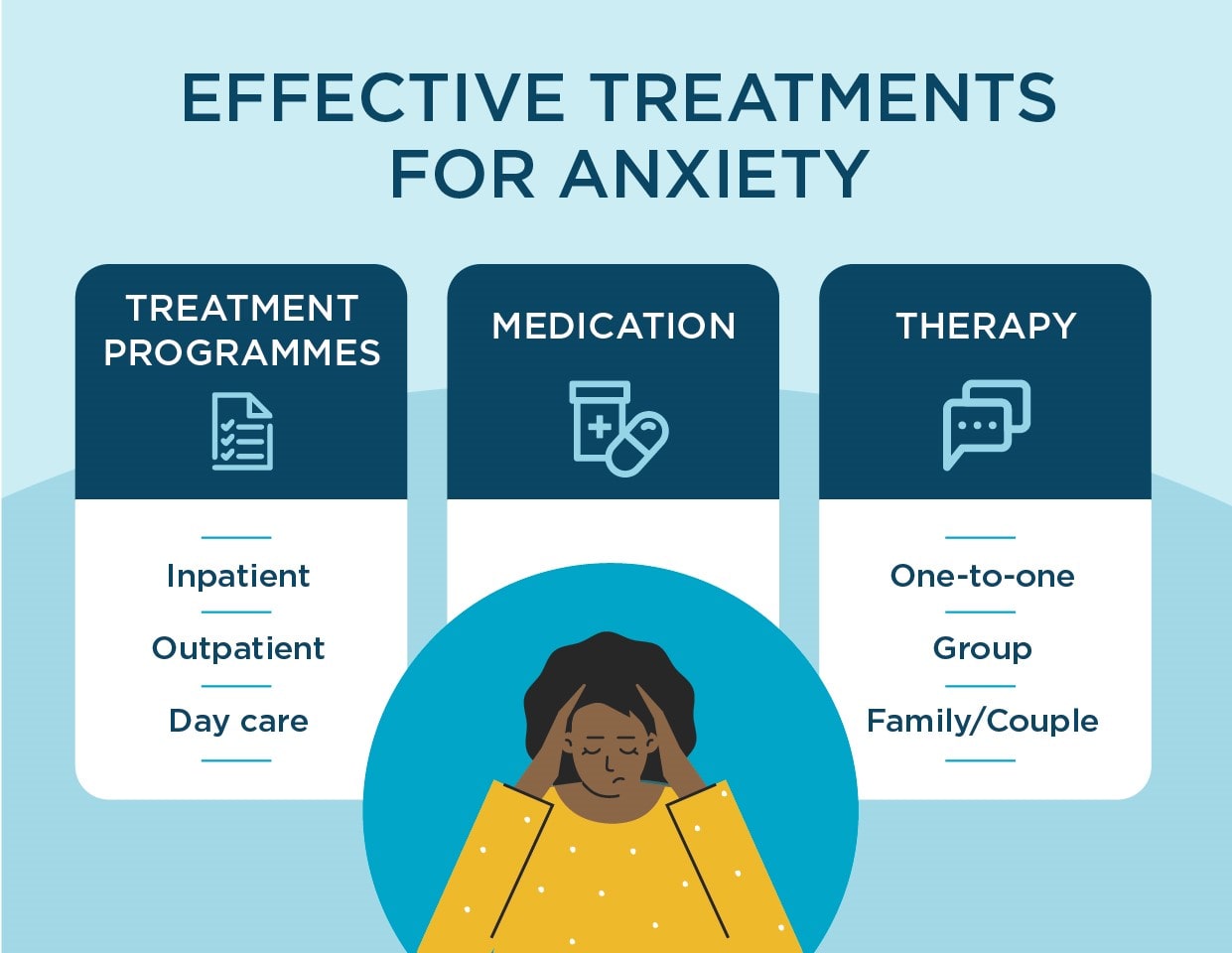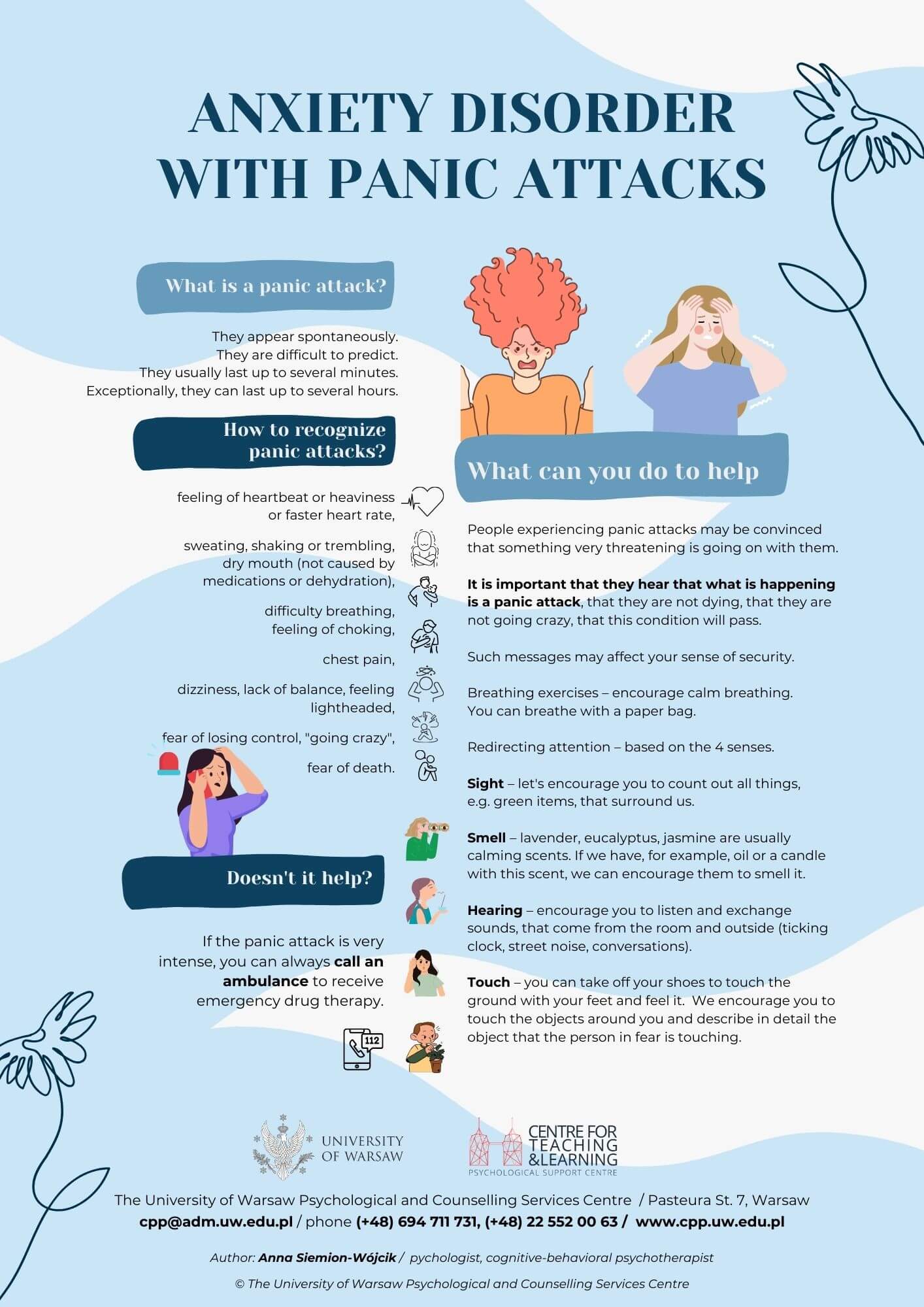Speak with a licensed therapist for anxiety and find peace of mind
Speak with a licensed therapist for anxiety and find peace of mind
Blog Article
Exploring Various Approaches in Therapy for Anxiousness Disorder for Enduring Change
When taking on stress and anxiety problems, it's important to discover a variety of therapy strategies. Each method uses one-of-a-kind insights and tools to assist you handle your symptoms efficiently. You could locate that incorporating techniques can produce the most effective outcomes. Recognizing the nuances of these techniques is essential to promoting long-term adjustment. What happens if the right combination could release a new level of emotional well-being for you?
Understanding Stress And Anxiety Conditions: A Short Introduction
Stress and anxiety conditions, which influence numerous individuals worldwide, can substantially influence day-to-day live. You could experience frustrating sensations of concern or stress that appear unmanageable. These feelings can result in physical signs like a racing heart, sweating, and even wooziness. Usual sorts of anxiousness conditions include generalized anxiety problem, panic attack, and social anxiousness condition. Each has special indications, but they all share a tendency to interrupt your regular and relationships.Understanding the root causes of your stress and anxiety is important. It could stem from genetics, mind chemistry, or life experiences. Acknowledging your triggers can aid you manage your responses much better. It's vital to keep in mind that you're not alone in this struggle. Many individuals deal with similar obstacles, and looking for help is a solid step towards feeling much better. By discovering anxiousness conditions, you're already on the course to understanding and managing your problem much more effectively.
Cognitive-Behavioral Treatment: Challenging Adverse Thought Patterns

Identifying Adverse Thought Triggers
Identifying the particular triggers behind your unfavorable thoughts can be crucial in managing anxiousness when you run into moments of distress. Start by taking notice of scenarios that prompt feelings of fear or worry. Is it a congested space, an upcoming target date, or a conversation with specific individuals? Take down these circumstances in a journal. This will assist you recognize patterns in your thinking. Likewise, notification physical sensations that accompany your unfavorable ideas, like a racing heart or tightness in your upper body. By determining these triggers, you acquire insight right into what's sustaining your anxiety. Comprehending these links is the initial step in challenging those thoughts and eventually reclaiming control over your emotional reactions.

Changing Thoughts With Positives
Testing negative thought patterns is a crucial action in transforming your way of thinking and decreasing stress and anxiety. You might often discover on your own entraped in cycles of self-doubt or disastrous thinking. As opposed to allowing these ideas determine your feelings, practice replacing them with positive affirmations or sensible options. When you think, "I can't handle this," shift it to, "I can handle difficulties one step at a time." This basic change can substantially influence your mood. Routinely identifying and countering these negative thoughts aids develop a much healthier inner discussion. Keep in mind, it takes some time and effort, but consistently practicing this technique can lead to long-term adjustment, encouraging you to deal with stress and anxiety with renewed confidence and strength
Structure Coping Techniques Together
Changing adverse ideas is just the beginning of handling stress and anxiety efficiently. To create lasting modification, you require to construct coping approaches that equip you. Cognitive-Behavioral Therapy (CBT) aids you recognize and test those purposeless idea patterns. Together, you and your counselor can discover exactly how these ideas influence your sensations and behaviors.Start by establishing practical strategies, like journaling or mindfulness exercises, that allow you to face anxiety head-on. When you encounter your worries gradually, you'll discover to respond in different ways.

Mindfulness and Acceptance-Based Approaches: Cultivating Present-Moment Awareness
As you navigate the complexities of stress and anxiety, including mindfulness and acceptance-based techniques can significantly improve your ability to grow present-moment understanding. By concentrating on the present moment, you'll discover that you can observe your thoughts and sensations without judgment. This method helps you recognize your anxiety without really feeling bewildered by it.Engaging in mindfulness exercises, such as deep breathing, body scans, or led reflections, allows you to ground on your own in your present experience. Acceptance-based techniques urge you to accept your emotions instead of combat against them. They shed their power over you.Incorporating these methods into your everyday routine can change how you react to anxiety when you approve your feelings. You'll establish resilience and find out to navigate demanding situations with better ease. Inevitably, cultivating present-moment understanding lays the foundation for enduring change, encouraging you to lead a more satisfying life.
Direct Exposure Therapy: Challenging Worries Progressively
Exposure therapy aids you confront your concerns in a steady way, making it much less frustrating. You'll learn methods to face anxiety-provoking circumstances detailed, while also developing coping approaches to manage your reactions. This technique encourages you to take control and decrease stress and anxiety with time.
Gradual Exposure Methods
When encountering anxiety, progressively confronting your fears can be a powerful method to gain back control. This strategy, referred to as progressive direct exposure, includes slowly subjecting on your own to the scenarios or objects that activate your anxiousness. Beginning with less intimidating situations and slowly work your method as much as more difficult ones. For example, if you hesitate of public talking, you could start by talking before a mirror, after that advance to sharing thoughts with a close friend, and at some point resolve a tiny team. Each action assists desensitize you to the worry, developing your confidence over time. Remember, it's important to pace on your own and commemorate little victories as you relocate via this process, reinforcing your ability to take care of anxiousness successfully.
Building Coping Strategies
Structure efficient coping techniques is essential for taking care of anxiousness, particularly as you confront your anxieties slowly. One powerful approach is exposure treatment, where you start by encountering your concerns in a controlled fashion. Begin with much less daunting situations and gradually work your means as much as more tough circumstances. This steady direct exposure assists desensitize you to stress and anxiety causes, making them less overwhelming.Incorporate relaxation methods, such as deep breathing or mindfulness, to soothe your mind during direct exposure. Track your progress, commemorating small success in the process to enhance your self-confidence. Keep in mind, it's okay to take your time; the objective isn't perfection however constant enhancement. By constructing these techniques, you'll encourage yourself to navigate anxiousness and embrace life a lot more fully.
Psychodynamic Therapy: Revealing Source of Anxiousness
Psychodynamic treatment explores the unconscious mind, disclosing the root triggers of your stress and anxiety - Counseling services for anxiety. By analyzing your thoughts, feelings, and past experiences, this technique aids you uncover underlying disputes and unsettled concerns that might add to your present anxiousness. You'll collaborate with a therapist to examine youth experiences, partnerships, and emotional patterns that shape your reactions today.As you get check this understanding right into these much deeper layers of your psyche, you'll start to recognize exactly how past occasions affect your present behavior. This understanding can result in catharsis, enabling you to process emotions you may have suppressed.Through the restorative partnership, you can additionally recognize protection devices that might have created over time, offering a clearer path to change. Ultimately, psychodynamic therapy equips you with the tools to address your anxiety at its core, advertising lasting change in your emotional well-being
Holistic and integrative Methods: Combining Techniques for Greater Efficiency
Incorporating different restorative methods can enhance your trip towards handling stress and anxiety much more effectively. By combining components from cognitive-behavioral treatment, mindfulness techniques, and alternative strategies, you can produce an individualized technique that addresses your one-of-a-kind demands. For circumstances, you may use cognitive-behavioral strategies to test negative idea patterns while integrating mindfulness exercises to ground on your own in today moment.Additionally, checking out holistic techniques such as yoga or reflection can promote leisure and minimize anxiety signs and symptoms. This blend permits you to establish better self-awareness and resilience.Experimenting with these diverse approaches can help you find what reverberates most with you. Keep in mind, it's concerning finding a harmony that functions, rather than adhering to a single method. This integrative approach not only uses prompt relief however additionally fosters long-lasting abilities for managing stress and anxiety, encouraging you to reclaim control over your life.
The Role of Support Equipments: Building Durability Via Link
While it might appear that handling anxiety is a singular journey, having a solid support group can play a crucial role in your resilience. Surrounding on your own with empathetic friends, household, or support system creates a risk-free area where you can honestly share your sensations and experiences. When you connect with others, you remind yourself that you're not alone in this struggle.These connections use encouragement and can offer useful coping strategies that have helped others. It's likewise a possibility to obtain viewpoint; pals can aid you see situations in a different way, lowering sensations of isolation.Moreover, psychological assistance promotes a sense of belonging, which can significantly ease anxiousness symptoms. By leaning on your support group, you can build resilience and deal with challenges more effectively. Remember, connecting for help signifies strength, and it can make all the distinction in your trip toward handling stress and anxiety.
Regularly Asked Concerns
What Are the Common Signs of Stress And Anxiety Problems?
You might experience restlessness, fatigue, trouble focusing, impatience, muscular tissue tension, and rest disturbances. Physical signs can include fast heart beat, sweating, and trembling. Identifying these indications early can help you seek appropriate support and therapy.

For How Long Does Therapy Commonly Last for Anxiousness Conditions?
Treatment for stress and anxiety disorders usually lasts anywhere from a couple of weeks to several months. It truly depends upon your private needs, development, and the techniques your specialist uses to help you manage your anxiousness successfully.
Can Medication Be Made Use Of Alongside Therapy for Anxiety?
Yes, medication can certainly be used together with therapy for anxiousness. click here now Incorporating both strategies frequently improves treatment effectiveness, aiding you handle signs while discovering underlying issues via therapy. Always consult your health care copyright for individualized guidance.
Are There Self-Help Methods for Handling Anxiety?
Yes, there are numerous self-help strategies for managing stress and anxiety. You can exercise mindfulness, involve in regular workout, maintain a balanced diet, establish a routine, and utilize deep breathing strategies to help in reducing anxiousness signs and symptoms effectively.
How Do I Know if I Need Specialist Aid for Anxiousness?
You should consider looking for expert help for anxiety if it disrupts see here now life, causes substantial distress, or if self-help approaches aren't functioning. Trust fund your reactions; getting to out can cause much better coping skills and assistance. Usual kinds of anxiousness disorders consist of generalised stress and anxiety condition, panic condition, and social stress and anxiety condition. When you encounter minutes of distress, identifying the certain triggers behind your negative thoughts can be crucial in handling anxiety. Changing negative ideas is just the beginning of managing anxiousness properly. By analyzing your thoughts, sensations, and past experiences, this strategy aids you discover underlying conflicts and unsolved issues that may contribute to your existing stress and anxiety. It's also a chance to get perspective; close friends can aid you see situations in different ways, minimizing feelings of isolation (Counseling services for anxiety).Moreover, psychological support fosters a feeling of belonging, which can significantly alleviate anxiousness symptoms
Report this page